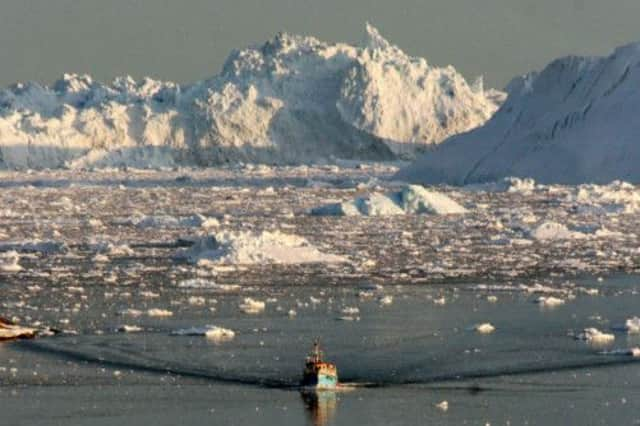Polar ice melt may be natural event


New research suggests more time is needed to predict the likely impact of global warming and ice loss on sea levels.
The ice sheets covering Antarctica and Greenland contain more than 99 per cent of the world’s glacier ice. If they melted completely, the global sea level would rise a catastrophic 63 metres.
Advertisement
Hide AdAdvertisement
Hide AdSince 2002, satellites have been monitoring the melting rate by measuring tiny gravity variations resulting from the movement of ice into oceans. The Grace (Gravity Recovery and Climate Experiment) mission has confirmed that a huge amount of ice is being lost – estimated at around 300 billion tonnes each year. The rate of loss is also increasing.
“Compared to the first few years of the Grace mission, the ice sheets’ contribution to sea level rise has almost doubled in recent years,” said Dr Bert Wouters, of the University of Colorado. But the cause of the melting still divides scientists.
Ice sheets are affected by many natural processes besides man-made warming, including atmospheric changes, shifting pressure systems, and El Nino and El Nina ocean temperature events.
“If observations span only a few years, such ‘ice sheet weather’ may show up as an apparent speed-up of ice loss which would cancel out once more observations become available,” said Dr Wouters.
His team compared nine years of Grace satellite data with reconstructions of 50 years of changes to the ice sheets. The researchers found their ability to detect an accelerating trend in mass loss accurately depended on the length of the data record.
Currently the amount of ice loss detected by the Grace satellites is larger than would be expected from natural processes alone. However, the speed-up of ice loss in recent years is not.
The findings, reported in the journal Nature Geoscience, suggest that predictions of ice sheet contribution to future sea level rises may be fraught with error.
Extrapolating the rate of today’s melting to 2100 could result in a forecast that is too high or too low by as much as 35 centimetres , said the scientists.
Advertisement
Hide AdAdvertisement
Hide AdWhile there might be almost enough satellite data to be confident about accelerated ice loss in Antarctica, another ten years of observations may be necessary for Greenland.
Earth scientist Professor Andrew Shepherd, of the University of Leeds, said: “It seems that studies based on less than a decade of satellite measurements are too short to establish, with confidence, whether the ice sheet losses are accelerating over time, and so we should be cautious about extrapolating short-term trends into the future.
“Fortunately, we can appeal to data from other, longer satellite missions to get a long-term perspective, and our own analysis of their data confirms that the rate of ice sheet losses has indeed accelerated over the past 20 years.”